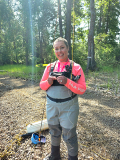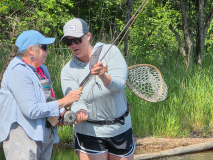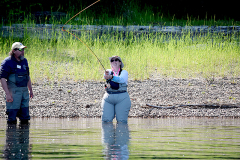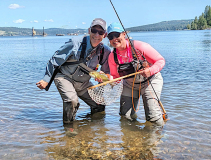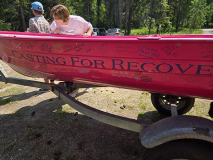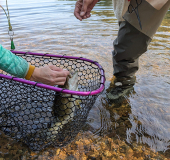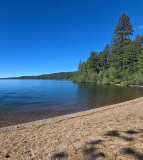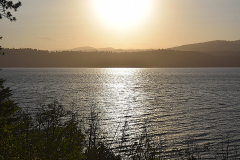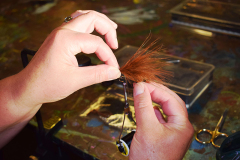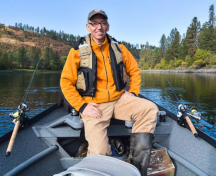No products in the cart.
Almost Sacred
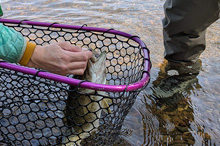
Fly Fishing Therapy
By John O’Bryan
I have wriggled myself into fly fishing waders on countless occasions, but this was the first day I put them on with a purpose. This was the day I would spend fishing with Casting for Recovery, a fly fishing organization that supports women fighting breast cancer.
The participants spend a weekend learning everything about fly fishing—how to cast, what fish eat, how to catch and release a fish, and they even learn to tie a few of their own flies—but more importantly, they learn that they are not alone, that they are strong, and that they can beat this terrible disease [see also “Reel Recovery,” IDAHO magazine January 2013, about a similar program for men].
As I pulled into the parking lot at the camp, I was met by Peg, a diminutive ball of energy who greeted each of the fly fishing guides with a hug and a smile, and told us where we needed to be and what we needed to do. Many of the guides, both men and women, had volunteered before, but I was a novice, and because of this, I was both anxious and eager to learn.
Peg assigned each of us a participant. Alison was my fishing buddy for the morning. Alison and I work together at Pullman Regional Hospital, and I had seen her a few weeks earlier and discovered she was going to be on the trip. Alison is a positive, omni-competent person who runs the External Relations Department, and she has breast cancer. We both started at the hospital at around the same time and I was excited to help her learn to fly fish and hear more of her story.
After Peg gave the guides their marching orders, we climbed into our cars and made our way to the rendezvous point. We honked our horns and hollered as we made our way to where these amazing women were waiting, decked out in waders. We climbed out, introductions were made, pictures were taken, rods were handed around, and then we headed to the lake to see if we could hook a few big fish.
But it turned out that this weekend really wasn’t about catching fish. Okay, it was, but it also wasn’t. As the women fanned out along the shore, I was struck by how poignant this day was. Here was a group of women struggling with what is likely the hardest thing they have ever had to deal with, and yet they were positive and upbeat and smiling and enjoying the beautiful day and excited to try out this new sport they had just learned about.
Alison and I picked out what we thought looked like a good spot and I stood watching as she pulled the flies out of her pack, picked one, and effortlessly tied it to her leader. Here was a woman who had fished before, and as she expertly flipped a beautiful loop onto the lake, I realized there would be very little teaching for me to do today. What ended up happening is that I learned a few things myself as we stood knee-deep in Lake Coeur d’Alene.
Alison, the author's fishing partner. John O'Bryan.
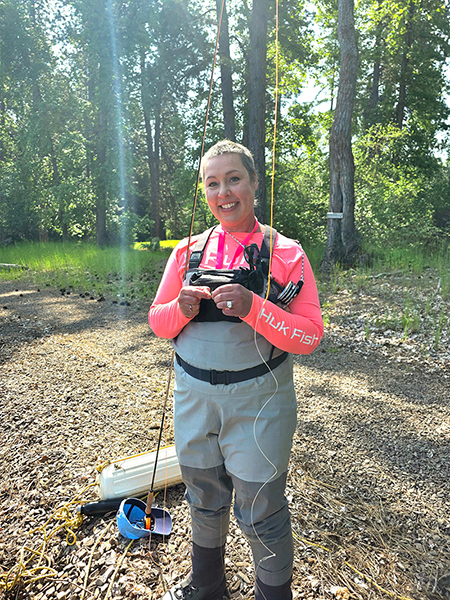
A novice gets assistance. John O'Bryan.
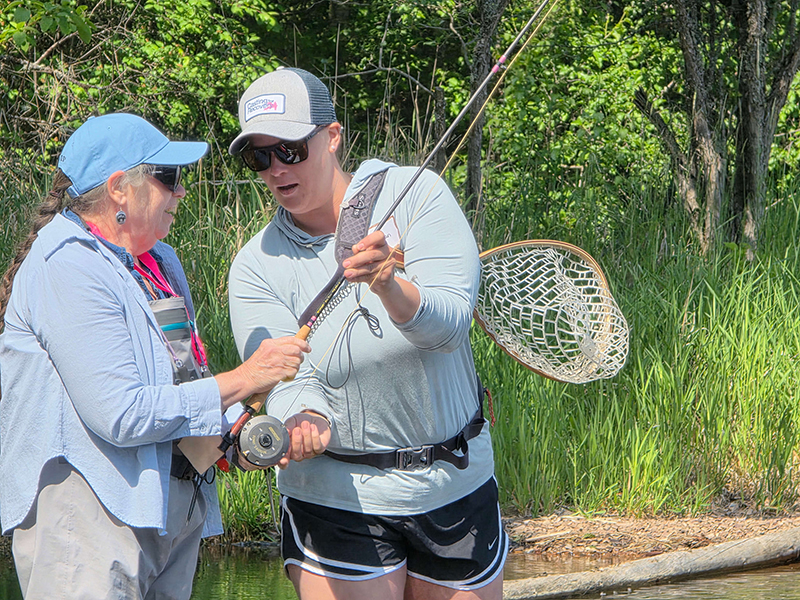
Casting under a watchful eye. Darlene Canaday.
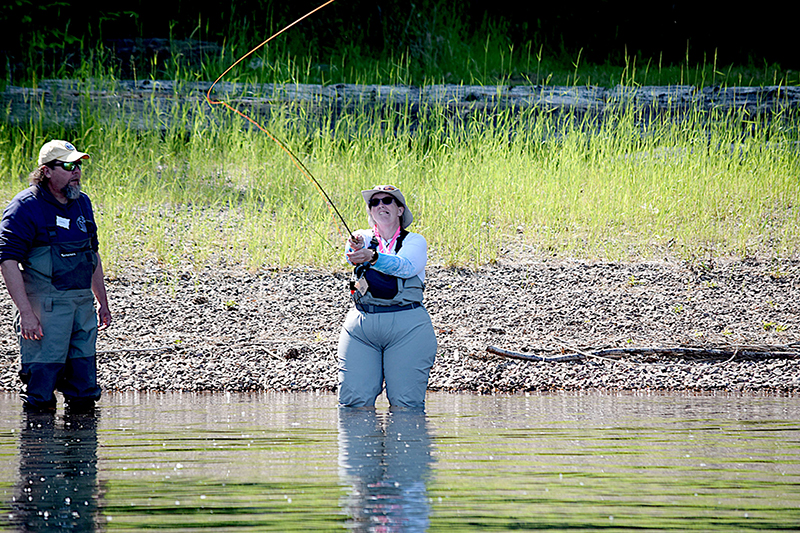
John and Alison. Peg Kingery.
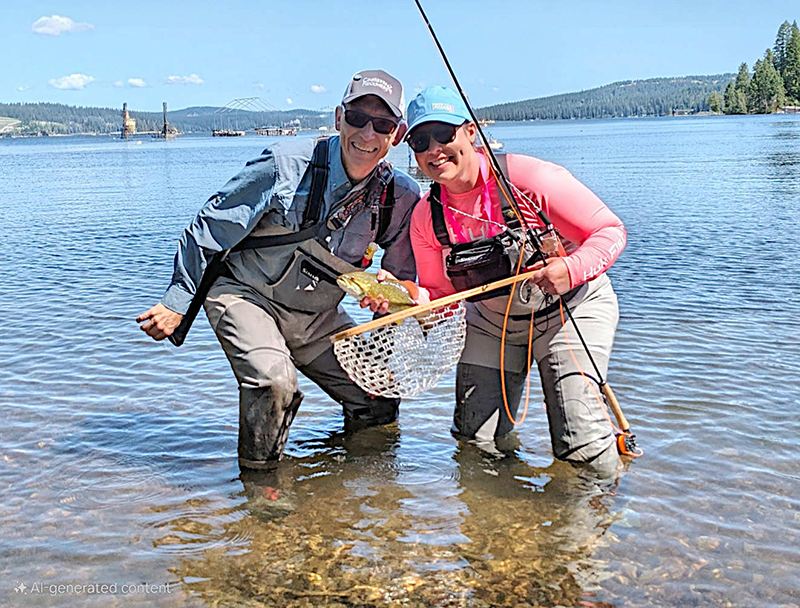
Ready to launch. Alison Weigley.
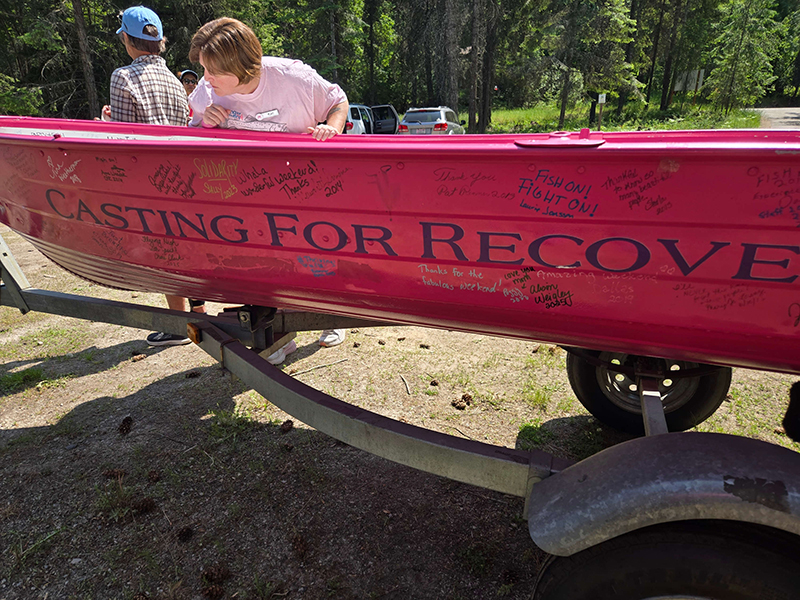
Netted. Peg Kingery.
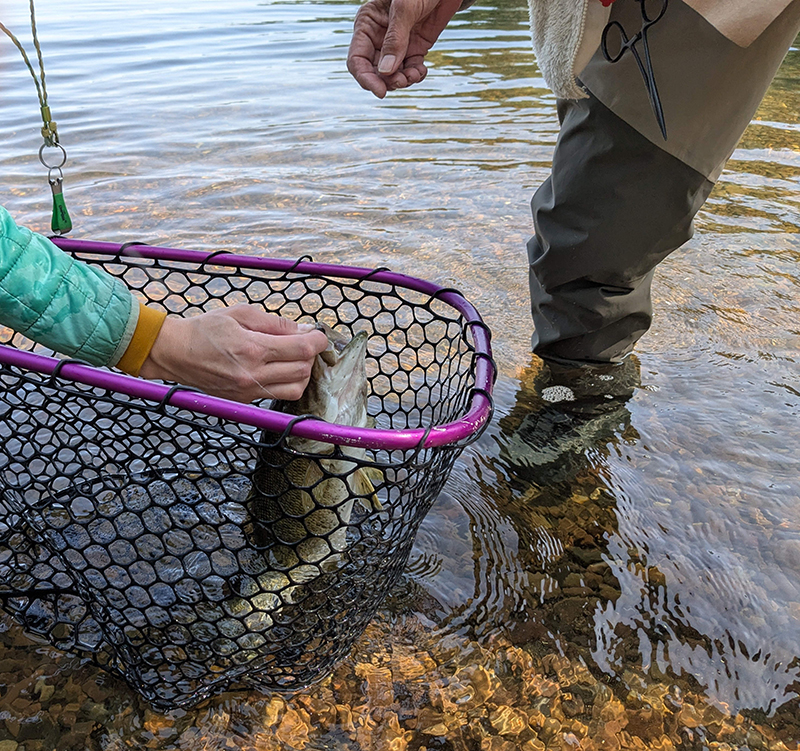
The fish await. Alison Weigley.
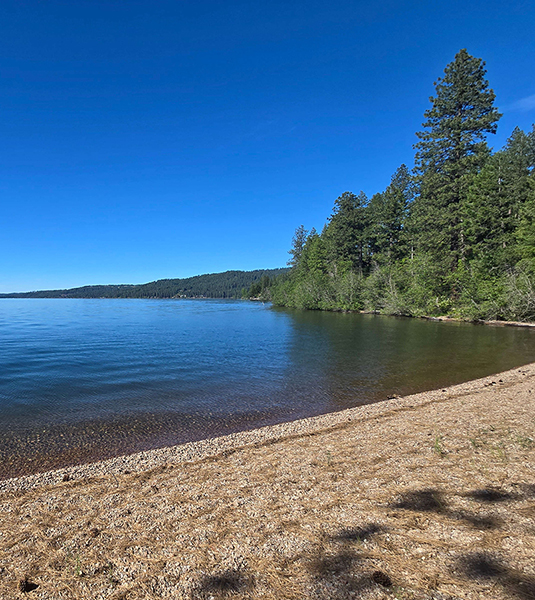
Scenic view in northern Idaho. Darlene Canaday.
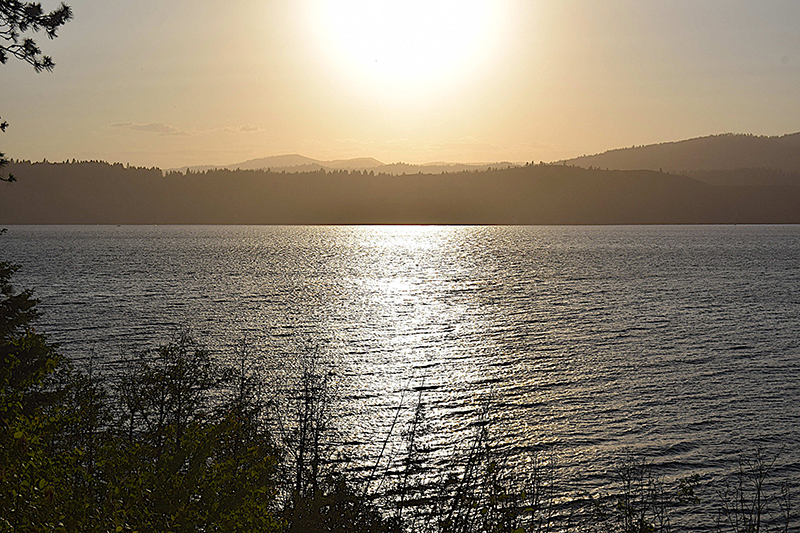
Tying a fly. Darlene Canaday.
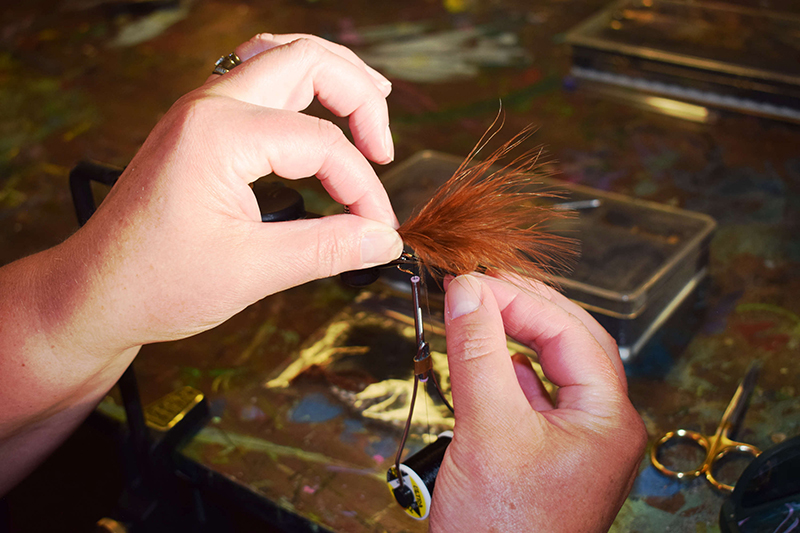
I first heard about Alison’s diagnosis when I sat next to her and her friend in the hospital café. They were looking at fancy wigs and laughing over the ones that would make her look like a British monarch. I asked why they were looking at wigs since she had a perfectly good head of hair already. She told me she had an aggressive form of breast cancer.
Her words smacked me in the face and I sat dumbfounded for a moment, not knowing what to say. I stared at her and told her how sorry I was. I didn’t know what else to say. I was shocked she wasn’t a blubbering mess, because I knew I was about to be. I was heartbroken and scared for her, but she told me in no uncertain terms that she was going to beat this thing. She smiled, I gave her a hug, and then I lost it on the way back to my office.
It’s an understatement to say this hasn’t been easy for her, but I’m not sure how else to put it. Someone who hasn’t gone through this has absolutely no idea how to describe the physical and emotional toll it takes on a person. It’s kind of like me trying to understand and describe the pain of childbirth—it’s just not possible. She has had to take a number of days off because of her surgeries and reactions to her treatments, but when she’s at work, she is the same person she always has been: upbeat, positive, and determined.
As she stood next to me in the water today, she had undergone months of treatments and surgeries with more looming in the near future, and she was still the optimistic and capable Alison I knew.
While she laid perfect cast after cast onto the water (there may have been one or two pile-ups, but not many), I asked her to tell me her story. As she unfolded her saga, I marveled at how strong she was and realized—yet again—that I could never in a hundred years go through what she’s gone through and still be smiling at the end of it. I would be a wreck, huddled in the corner, but as she laid out her story as expertly as she did her casting, she gave me hope.
She told of surgeries and pain and sickness and embarrassment and joy and kindness, and an amazing husband who has supported her from the moment she told him of her diagnosis. She spoke of kicking this thing’s ass and then her goal of supporting others who have been newly diagnosed or who are struggling as they go through treatment. She interspersed her own story with those of others she had heard during the weekend.
That’s when it hit me—I mean really hit me—that these women have cancer. You might think, “Well, of course they do,” but it is one thing to say someone has cancer and something completely different to understand what that means. Just writing the word “cancer” shocks me.
Every single woman cheerfully casting a line in the water is going through one of the worst things anyone can go through. Cancer is what we all fear, and for every one of these women, that fear has become reality. They have all had a doctor tell them they have cancer, and each of their lives has changed because of it.
And yet here they were, smiling and laughing and learning to cast a fly onto the water in hopes of catching a fish. It made me think of all the petty things I worry about every day and how none of my worries was significant compared to the impact cancer has had on their lives.
Learning to fly fish seemed momentarily meaningless compared to the challenges they were facing, and yet, oddly enough, as I stood watching them, I realized it was not meaningless. How could it be? People standing next to each other, listening and learning and caring and responding and feeling heard, and the guides feeling joy at being trusted enough to have someone share what they are going through. It seemed almost sacred.
And when fish were caught and the cheers were heard up and down the beach, it made me smile at how these women were cheering for each other in life, too. Loudly cheering for each other in life. We all need someone to cheer us on and tell us we can do whatever it is that needs doing—and for these women, doubly so.
That’s why programs like CfR are special. They bring people together who need support and help and comfort, and in the process soon realize they are offering care and support and comfort to others, too. It’s a moment of meaning and purpose in the midst of something awful—and it’s a powerful thing.
A few of us caught fish, and when one was caught, pictures were taken, hot flies exchanged, and then someone else stepped into the “honey hole” where fish could be seen moving around. Not everyone caught fish, and that was okay.
One of the women wanted to learn to cast well, and by the end of her lesson she was rolling loop after beautiful loop far out onto the clear blue water. She caught nothing, but was well pleased with what she had learned.
Others sat and talked, either too tired or too sore to fish for more than a few minutes. Some walked up and down the beach watching and talking, but everyone laughed and cheered at the success of others.
And this all happened because of fly fishing. Fly fishing. I love fly fishing and tying flies. I have taught many different groups this art, and I am constantly amazed at how special this sport is, but I had no idea that some day I would be standing in the water casting a fly with a friend, learning how strong she is and how determined she is to beat breast cancer.
I have no doubt she will.
Oh, and she did catch a really, really nice bass on a fly—and that’s pretty cool too.
It was a beautiful day.
Casting for Recovery (CfR) is a nonprofit group. There is no cost to participants in CfR retreats, sixty of which will be held nationwide in 2025, including four in Idaho. For more information (to volunteer, find a retreat, or offer support), visit: www.castingforrecovery.org or contact Peg Kingery, [email protected]
This content is available for purchase. Please select from available options.
Purchase Only
Purchase Only

